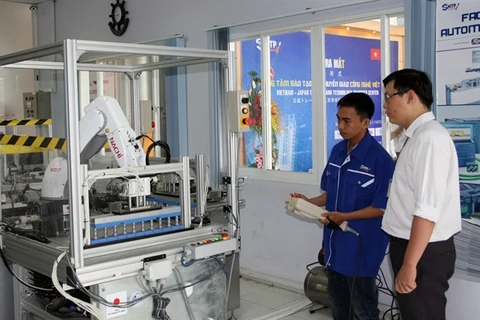Hanoi (VNA) - The European Union (EU) plans to increase investment in Vietnam this year, especially in high-tech industries, while the Centre for Strategic and International Studies (CSIS) of the US said that Vietnam is emerging as a new digital powerhouse in Southeast Asia.
According to website https://www.fibre2fashion.com/, more investment from the EU is expected in Vietnam this year in high-tech industries and green and sustainable businesses.
Vice-Chairman of the European Chamber of Commerce (EuroCham) in Vietnam Jean-Jacques Bouflet recently said the southern province of Binh Duong is one of the three most important localities in EuroCham’s cooperation programme in the country.
In January, a working group of the chamber in Vietnam, led by Bouflet, visited the province to work on business and investment opportunities. Binh Duong, one of the country’s top foreign investment destinations, is now expecting further EU investment in its green economy, sustainable business, financial services, energy and logistics.
In January this year, the ministry of planning and investment (MPI) announced that Vietnam attracted 2.1 billion USD worth of FDI, up 4.2% year-on-year, of which foreign-invested enterprises increased 1.27 billion USD in their existing projects.
The increase was contributed by large investments from EU member countries. For instance, French funding in Vietnam in January alone reached 25.44 million USD, up from 2.28 million USD in January last year. German investment in Vietnam hit 12.77 million USD during the period, compared to 0.96 million USD in the same month of 2021.
The latest Business Climate Index - a periodic barometer of European business leaders and investors from EuroCham – shows European companies ended 2021 more optimistic about Vietnam’s trade and investment environment.
As many as 43% of these firms plan to increase their investment in the first quarter of 2022, compared to just 17% three months ago.
Likewise, more than one-third (38.5%) intend to increase their headcount, up around 15%, while over half (51.5%) are predicting a rise in orders and revenue.
Meanwhile, the Centre for Strategic and International Studies (CSIS) of the US said that Vietnam is becoming a new digital powerhouse in Southeast Asia.
In its article “Vietnam’s Twin Tech Challenge: Spearheading While Catching Up” run on csis.org on February 17, the CSIS said Vietnam has emerged as a centre for dynamic growth in the region.
Although the gross merchandise value of Vietnam’s internet economy currently lags behind a number of its neighbours, at an estimated 21 billion USD in 2021, that figure is expected to reach 150–220 billion USD by 2030.
According to CSIS, Vietnam’s policies are designed to position it as a regional hub for tech and semiconductor manufacturing. Tech giants like Apple, Samsung, LG, and Foxconn, among others, have a strong presence in the country.
Despite the pandemic, foreign direct investment (FDI) in the tech sector continues to flow in for development and manufacturing by companies like Microsoft, Sony, Pegatron, Nokia, Panasonic, Intel, and Canon.
Vietnam is now also a regional hub for research and development (R&D) outsourcing for Cisco, Alcatel-Lucent, Toshiba, Hitachi, and Jupiter Networks, among others.
Vietnam is on its way to becoming a key semiconductor player in the region and an increasingly critical link in the global supply chain, said the centre.
Vietnam is applying many policies, including tax incentives, to facilitate high-tech investments. As a developing economy, Vietnam’s digital market has huge and credible potential.
Under the country’s master plan for the fourth Industrial Revolution, Vietnam expects to be named among the 40 top performers in the Global Innovation Index, the top 30 in the International Telecommunication Union’s Global Cybersecurity Index, and the top 50 in the United Nations e-Government Development Index by 2030.
The Vietnamese government wants the digital economy to contribute to around 30% of GDP and for productivity to expand 7.5% annually, on average. It also aims to complete and establish smart cities in key economic zones across the country.
Vietnam has a 70.3% internet penetration rate, ranking fourth in Southeast Asia./.
























